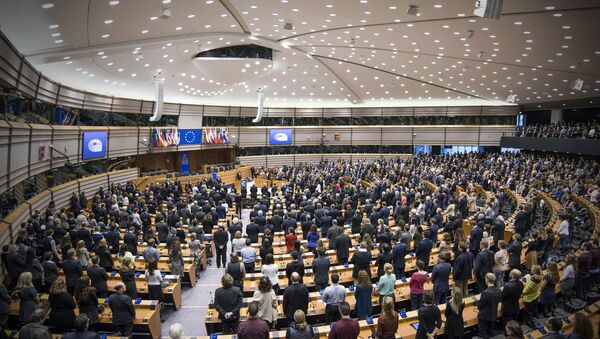European lawmakers are voting to call for action to combat radicalization following a series of terrorist attacks in France, Belgium, Tunisia and Copenhagen, as well as the bombing of the Russian Metrojet aircraft over Egypt, in a move which critics say is too late.
More than 5000 European citizens have joined terrorist organizations and other military formations, particularly ISIL, Jahbat al-Nusra and others outside the European Union, especially in the Middle East and North Africa (MENA) region.
— connOr claytoR (@connor21claytor) November 19, 2015
Saying no to refugees = more ending up in poor countries, vulnerable to resentment and radicalization. It's a self defeating proposition.
— Cap'n Shaq Sparrow (@shaq3696) November 18, 2015
Attention has fallen on the poor Brussels district of Molenbeek, from where the terror attacks in Paris on November 13 were coordinated. Belgian police have so far arrested dozens of people following the Paris atrocity. Brussels remains in near-lockdown as it maintains its highest security alert level, which will be reviewed again next week.
Leaking 'Like a Sieve'
Many in Europe are asking how Paris attacks ringleader Abdelhamid Abaaoud was able to return from Syria several times via the migrant route of Greece without being detected. Many say the mass movement of asylum seekers — which has caused such chaos in Europe — allowed terrorists to move around borderless Europe with impunity.
The European law agency director Rob Wainwright told a committee of European lawmakers that the EU-wide database for sharing details of known jihadists between intelligence agencies in order to disrupt plots — the Focal Point Travelers system — has weaknesses:
"We are only confident we have 2,000 names in the system, even though the general assessment across Europe is there are at least 5,000 European nationals who have traveled to Syria and Iraq."
Many politicians across Europe have been warning that the Schengen borderless Europe agreement lies in tatters, after it was exposed as not being secure, allowing millions to come and go unchecked.
One French official told the London Telegraph newspaper, the EU's borders were "like a sieve".
A resolution to the European Parliament Tuesday: "Calls on the Member States to coordinate their strategies and share the information and experience at their disposal, to implement good practices at both national and European level, to cooperate with a view to taking new steps in combating radicalization and recruitment to terrorism by updating national prevention policies and putting networks of practitioners in place on the basis of the ten priority areas for action as identified in the EU strategy for combating radicalization and recruitment to terrorism."
…I truly believe our grand scale paranoia will make more terrorists that our kids will be fighting.
— Andy Richter (@AndyRichter) November 21, 2015
Critics will say the action is too little too late as the European lawmakers attempt to close the door after the horse has bolted. Meanwhile, they are presiding over the fall of one of the most cherished of EU policies — the freedom of movement of people — and terrorists.



